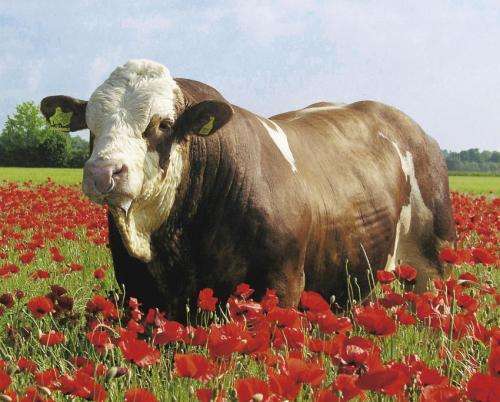Fleckvieh bull in pasture. Credit: Bayern Genetik GmbH
(Phys.org) —A large team of researchers with members from Australia, France, Denmark, the U.S., Germany, Canada and the Netherlands, is reporting that 234 cattle have had their genomes sequenced as part of Phase I of the 1000 bull genomes project. In their paper published in the journal Nature Genetics, the researchers highlight the goals of the project, how it's carried out and describe some of their initial findings.
The 1000 bull genomes project was started by a large number of people in the bovine research community—participants come from countries all over the world. The aim is to seek out and identify the genes responsible for both positive and negative attributes of both male and female cattle. The idea is to get ranchers and others with access to cattle to submit genetic samples for analysis, the results of which can be added to a single large database that will be made available to anyone interested in the results. In more specific terms, the goal is to reduce the number of cattle that have what are considered to be genetic defects to increase the percentage of healthy cattle that can be used in beef and dairy products production.
In Phase 1 of the project, team members report that 234 (232 bulls and 2 cows) cattle have had their genomes sequenced—all from three breeds: Jersey, Fleckvieh and Holstein-Fresian. Each of the animals selected for inclusion in the project were prescreened—each needed to be representative of "key ancestors" which means they have the majority of the genetic variations for their breed.
The team reports finding (among 28.3 million variants) genetic mutations responsible for conditions that lead to embryonic loss, curly fur and chondrodysplasia. Adding such information to a database can help beef and dairy product producers determine if newborn calves will grow to become viable and productive bulls or cows—culling those that are not increases revenue and profits.
Eventually, millions of cattle from across the globe will be included in the project with the genome database growing larger and more productive along the way. Cattle raisers interested in joining the project must have at least 25 animals that are likely to be approved by the group's steering committee.
More information: Whole-genome sequencing of 234 bulls facilitates mapping of monogenic and complex traits in cattle, Nature Genetics (2014) DOI: 10.1038/ng.3034 . www.nature.com/ng/journal/vaop … nt/full/ng.3034.html
Abstract
The 1000 bull genomes project supports the goal of accelerating the rates of genetic gain in domestic cattle while at the same time considering animal health and welfare by providing the annotated sequence variants and genotypes of key ancestor bulls. In the first phase of the 1000 bull genomes project, we sequenced the whole genomes of 234 cattle to an average of 8.3-fold coverage. This sequencing includes data for 129 individuals from the global Holstein-Friesian population, 43 individuals from the Fleckvieh breed and 15 individuals from the Jersey breed. We identified a total of 28.3 million variants, with an average of 1.44 heterozygous sites per kilobase for each individual. We demonstrate the use of this database in identifying a recessive mutation underlying embryonic death and a dominant mutation underlying lethal chrondrodysplasia. We also performed genome-wide association studies for milk production and curly coat, using imputed sequence variants, and identified variants associated with these traits in cattle.
Journal information: Nature Genetics
© 2014 Phys.org





















